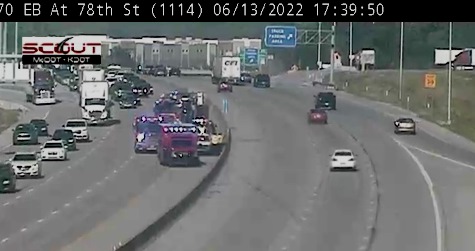by Noah Taborda, Kansas Reflector
Topeka — Gov. Laura Kelly on Monday said the new law gradually eliminating the state sales tax on food will benefit Latino Kansans who are disproportionately affected by food insecurity.
In part because of the pandemic, a growing number of people across Kansas rely on food pantries. According to Feeding America, Food insecurity rates rose from 12.1% to 14.1% in 2020.
Adding to the issue are rising costs at grocery stores, with prices up by about 8.5% in the past year. During this time, communities of color felt a disproportionate impact of COVID-19 on their access to food.
House Bill 2106 would eliminate the 6.5% grocery sales tax — the second highest in the nation — by 2025, providing needed financial flexibility to ensure Latino Kansans have all their needs met, Kelly said during an appearance at Mi Pueblito Meat Market, a Latino-owned grocery store in Topeka.
“No Kansans should ever have to choose between paying for food and paying for gas or health care or rent,” Kelly said. “Having a high grocery tax means more Kansans are forced into making that untenable choice far too often. The truth of the matter is that food sales tax takes the most from those who have the least.”
The governor’s appearance in Topeka was the final stop in a tour across a handful of Kansas communities promoting the legislation, which was voted into law with bipartisan support. In Wichita, Kelly discussed how the tax cut would reduce food insecurity, and in Kansas City, Kansas, the Democratic governor addressed making grocery stores along state borders more competitive.
Kelly was joined at Alonso Villasenor’s grocery store by members of the local legislative delegation and Latino community stakeholders to discuss the impacts cutting the food sales tax would have. According to Kelly, elimination of the tax would save a family of four $500 per year on reduced grocery costs.
“Soon, Kansans will have more money in their pockets to afford their groceries and treat their families to Alonso’s famous tacos,” Kelly said, touting her efforts to bring Republicans and Democrats together on this action.
The spokesman for Derek Schmidt, Kelly’s presumptive Republican opponent in the governor’s race, said this was just another “carefully scripted, election-year photo op taking credit for other people’s work.”
“She vetoed this food tax cut before, and only this year with her own job on the line did she follow Attorney General Schmidt’s lead,” said C.J. Grover, the campaign manager for Schmidt. “Kansans will have a choice in November between Laura Kelly, who focuses on hatchet-wielding publicity stunts, or Derek Schmidt, who works with the Legislature to deliver real results for Kansas families.”
In vetoing the 2019 bill, Kelly argued it would have set the state back by predominantly providing relief to large, multinational corporations who hoped to evade paying state income taxes on overseas profits.
In 2002, as a state Senator, Schmidt voted to increase the sales tax on food from 4.9% to 5.3%.
The 6.5% state sales tax on groceries will drop to 4% on Jan. 1, 2023. Subsequent reductions would take it to 2% in 2024 and zero by Jan. 1, 2025.
The proposal will not affect local sales taxes on groceries, and the total elimination of the grocery tax will reduce annual state revenues by about $500 million.
Aude Negrete, executive director of the Kansas Hispanic and Latino American Affairs Commission, praised the governor for remaining engaged on issues of importance to the state’s Latino population.
“An extra $500 per year will go a long way to helping our families buy the food they need to keep their kids healthy and it’s an accomplishment that will impact everyone — both Latino and non-Latino,” Negrete said.
Kansas Reflector stories, www.kansasreflector.com, may be republished online or in print under Creative Commons license CC BY-NC-ND 4.0.
See more at https://kansasreflector.com/2022/06/13/reducing-food-sales-tax-benefits-latino-communities-kansas-governor-says/

